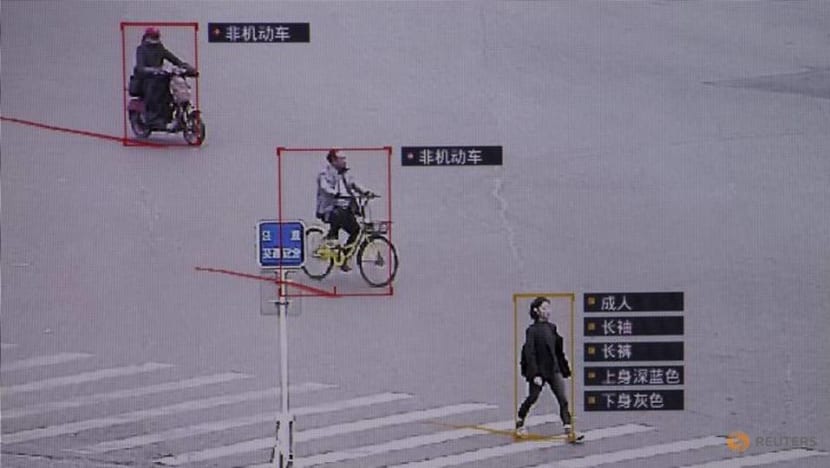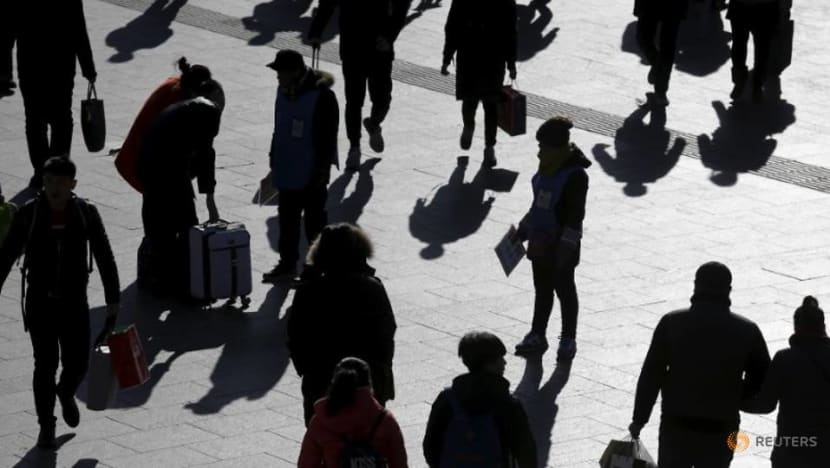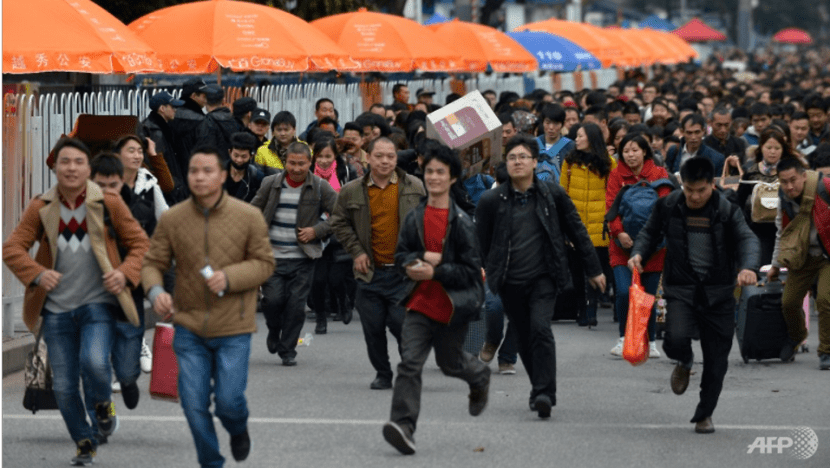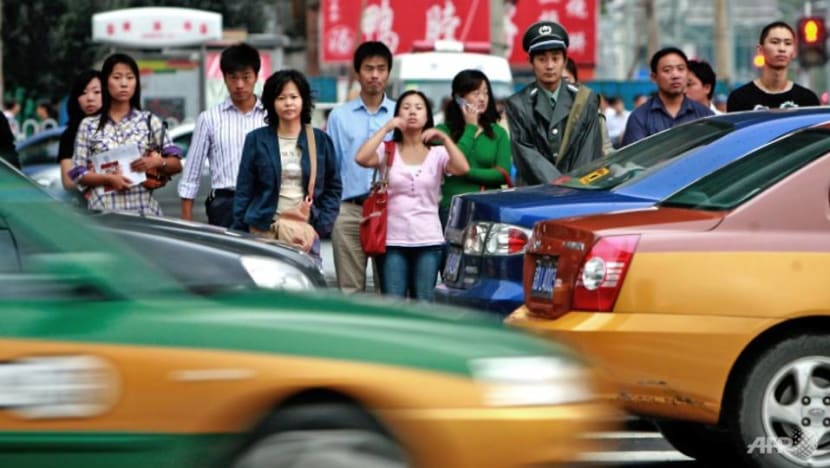commentary Commentary
Commentary: Rating citizens - can China’s social credit system fix its trust deficit?
The gamification of behaviour over the long run may also promote a culture in which good deeds are valued for their attendant incentives and not for their inherent merit, says Yew Chiew Ping.

A surveillance software identifying details about people and vehicles shown in this demonstration in Beijing, China on Oct 11, 2017. (Photo: REUTERS/Thomas Peter)
SINGAPORE: In China, the lack of trust runs so deep that people are chary of helping the elderly who have fallen down or collapsed in the street.
Fears of being extorted for compensation by opportunistic “victims” – which has happened to good samaritans in widely reported cases in China – led many to turn a blind eye to the misfortunes of others, often with tragic consequences.
Some of us may recall the 2011 incident of the two-year-old girl in Guangdong who was run over not once but twice, because close to 20 passers-by did not bother to lend a helping hand while the girl was lying on the ground after being hit by the first vehicle.
This heart-breaking episode, alongside the 2008 toxic milk powder scandal and innumerous food safety incidents, have prompted the Chinese to decry and reflect on their society’s moral decay.
But have the nationwide outrage and debates done much to alleviate Chinese society’s moral crisis?
Just last year in Henan, a woman knocked down by a vehicle was run over a second time after she was ignored by passing pedestrians and vehicles.
This year, a Chinese drug company was found to have produced 500,000 faulty vaccines for babies. Substandard vaccines for children have also been uncovered in China in 2010, 2013 and 2016.
China’s moral malaise and society’s frustration over such incidents may explain why most Chinese have quietly accepted the Orwellian social credit system, now piloted in a number of Chinese cities in Shanghai, Beijing, Guangdong, Fujian, Sichuan and other provinces.
READ: In China, why dialects like Cantonese are on the wane, a commentary
TECHNOLOGY AS THE PANACEA FOR IMMORALITY
In some Chinese cities, if you have wilfully defaulted on paying your debts, callers to your mobile phone will hear this message instead of the usual ringback tone:
“This is a friendly reminder from the people’s court of XX city. The person you have just called has been declared a trust-breaker subject to enforcement by the court …”
You may also experience 15 minutes of fame when your photograph, name and your offence are publicised on cinema screens and on digital billboards at the airport, railway station, shopping malls and other public spaces.

In Shenzhen, jaywalkers who are captured by facial-recognition technology will see their faces immediately appearing on video screens in the street.
Naming and shaming is not all.
The innocuous-sounding social credit system is the Chinese state’s ambitious scheme to harness surveillance technology to shape the behaviour of citizens and businesses in many imaginable aspects.
It has a far broader scope than existing credit rating systems such as Germany’s SCHUFA or the United States’ FICO.
Through facial recognition and other forms of artificial intelligence, the Chinese government collects wide-ranging data on individuals and companies on a massive scale.
The data, which includes online interactions, adherence to traffic rules, financial and criminal records, and virtues such as filial piety, is then translated into a score that is tied to rewards and penalties.
As a credit offender or a “trust-breaker” (shixinzhe) blacklisted by the government, your below-par social credit rating means you will encounter all sorts of restrictions in your day-to-day life, including your access to Internet services, eligibility for loans, school admissions and government jobs, and even access to forms of transport such as high-speed trains and planes.
In a Shandong city, all residents are allotted a baseline score of 1,000. Based on their scores in 600 over types of social and financial activities, residents are then ranked into six categories from the exemplary AAA to the discreditable D.
Said a resident whose involvement in volunteer work had earned her a triple A rating, “Because my credit rating is high, I enjoy priority service at government departments. When using government shared bikes, not only am I exempted from paying a deposit; I can even ride for free for two hours.”
Given that 80 per cent of respondents in a 2018 opinion poll conducted across China have approved of the social credit system, it seems that most Chinese, for now, do not consider the drastic surveillance scheme a violation of their privacy.
Instead, most see the merit of the system in the perks they may enjoy and its potential in fostering trustworthiness in society.

READ: China banning Facebook and Google now looks smart considering recent data breaches, a commentary
THE PROBLEM WITH A SOCIAL CREDIT SYSTEM
We may not realise it, but with the ubiquity of CCTV cameras and the popularisation of the Internet, living in a society where our behaviour is constantly being monitored is already a reality.
But imagine if you are denied access to train services because you have forgotten to pay your utility bill, or if keeping up with the Joneses now entails competing with friends on social media to see who has the higher social credit score.
The dystopian vision associated with China’s social credit system is why it has been condemned by the western media.
Apart from its totalitarian tendencies and the obvious privacy infringements, the pilot project has other salient drawbacks and throws up many questions.
First, what if the government itself is the “trust breaker”?
Under China’s policy, government organs are to be held accountable under the social credit system too.
However, the feasibility of this is highly questionable since the government is simultaneously the enforcer, the appraiser and the appraisee.
For instance, many local governments in China have often failed to repay debt ranging from a few thousand to tens of million yuan, including loans, payment to contractors, and compensation for seized land. Since local governments are the ones that assess trustworthiness and mete out punishment, will they themselves be subject to the same penalties as other defaulters?
The second question is related to the first: What mechanisms are in place to prevent political abuse?
Although the social credit system is avowedly conceived to address the trust deficiency in Chinese society, there is nothing stopping the government from using it for self-serving purposes.

Take, for example, the pilot scoring system in a Jiangsu county, whose people have been described by the local government as “pugnacious and adept at taking legal action”.
In this county, slandering others online will take 100 points off your social credit rating, while manufacturing and selling fake products will set you back by merely 35 points.
Someone who may be rightfully seeking redress by occupying government offices may be slapped with a 50-point deduction, the same penalty as someone who has given or received bribes.
The arbitrary and controversial penalties seem to be exacted for the ease of local governance, punishing those who dare to confront the government, rather than to promote integrity in society.
Third, what are the avenues for restoring credit?
Not surprisingly, the pilot schemes have so far devoted little attention to avenues for the maligned to appeal and restore their credit rating, much less consider the long-term damage to one’s reputation caused by the name-and-shame approach.
For all their good intentions, Chinese policymakers have failed to see how the initiative, in a society where the legal system is weak and corruption rampant, may create yet another social divide where the underprivileged may have to suffer the consequences of chronically low credit scores, while the well-to-do can easily find ways to game the system and reap rewards for high scores.
For example, there are already reported cases of users in a commercial pilot scheme taking advantage of data black markets to boost their credit scores, which, in turn, help them obtain low-interest loans.
Instead of inculcating the desired virtues, the gamification of behaviour over the long run may also promote a culture in which good deeds are valued for their attendant incentives, and not for their inherent merit.
Dr Yew Chiew Ping is head of the Contemporary China Studies Minor at the Singapore University of Social Sciences.














